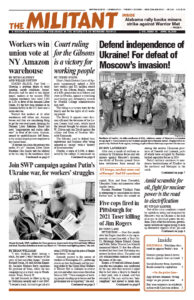Mounting condemnation of Moscow’s brutality at Bucha fill the pages of the capitalist press following the release of pictures and eyewitness accounts of the massacre carried out there by Russian armed forces. The brutality reflects the disdain of Vladimir Putin and his government for the lives and desire for independence of Ukrainian working people. Our response should be to redouble our efforts to protest Putin’s invasion and slaughter.
But the denunciations from the U.S. rulers and other imperialist powers — and threats of more sanctions that hit hardest at Russia’s workers and farmers — are crocodile tears. From My Lai in Vietnam to Hiroshima and Nagasaki to the carpet-bombing of civilians in Korea, the U.S. capitalist rulers have rained death and agony on workers as an intrinsic feature of their wars. This mirrors the disregard bosses have for workers maimed and killed on the job in coal mines, oil refineries and other worksites here at home, which they view as “collateral damage” in their drive for profits.
Like the U.S., Russia is a class-divided country. The overwhelmingly majority of Russians are workers and farmers, who are not responsible for the killings of Ukrainians.
This is a war unleashed by Putin’s regime to crush and conquer Ukraine. “Putin insists Ukraine is not a nation and has no right to exist as one,” Socialist Workers Party National Secretary Jack Barnes said in a March 3 statement widely distributed by party members.
As Russia’s capitalist rulers seek to crush independent nations like Ukraine and restore the czarist prison house of nations, they also wage war against the wages, conditions, dignity and political rights of working people across Russia, including the workers in uniform who make up the ranks of Russian military forces. Over 15,000 Russians have been locked up, and many beaten or tortured, for protesting Putin’s war.
The defeat of the Putin regime’s invasion is in the interest of working people worldwide. Blaming workers in uniform for capitalist wars — not the rulers who send them to fight and die — points away from the very class forces crucial to ending this carnage.
This exact question was hotly debated by anti-war forces seeking the defeat of the U.S. rulers’ war against Vietnam. Especially after Washington’s massacre at My Lai in 1968, some protesters wanted to brand all GIs as “baby killers” and protest against them. At the time, growing numbers of GIs were stepping forward to demand the U.S. government pull them out of Vietnam. The Socialist Workers Party fought to defend GIs’ right to discuss and protest the war, and built campaigns to overturn reprisals by the army brass against those who spoke out.
The SWP led the way in winning the anti-war movement to reach out to the troops with the truth about the imperialist war and to win them to join in fighting against it. SWP presidential candidate Fred Halstead traveled to Saigon that same year and met with GIs there to discuss the fight against the war. This was part of the party’s broader working-class strategy — winning the only class that can end imperialist wars, and the unions, to the movement.
There are examples of fraternization between Ukrainian workers and Russian soldiers, but the capitalist regime of Volodymyr Zelensky and his backers in Washington have no interest in this. The last thing they want is to deepen collaboration between workers in Russia and Ukraine.
But without looking toward workers and farmers in Russia, including soldiers, as part of an international class with common interests, there is no road to getting rid of the thug regime in the Kremlin, much less ending capitalist rule there, in the U.S. and elsewhere, and replacing the warmakers with governments that serve the interests of the toiling majority. The capitalist rulers in both Russia and the U.S. seek to tie working people to their foreign policies, knowing they will wage more wars around the world to advance their own predatory class interests.
Workers need our own foreign policy, independent of the bosses, just as we need to fight for what our class needs at home — jobs, better wages and conditions, and to take political power into our own hands.
After all, Russia’s workers and farmers have shown in the past they have the capacity for independent struggle, for taking on their own capitalist rulers. In 1917, under the leadership of V.I. Lenin and the Bolshevik Party, they brought down the czarist prison house of nations, helped end the first imperialist world war, and made the world’s first socialist revolution.

